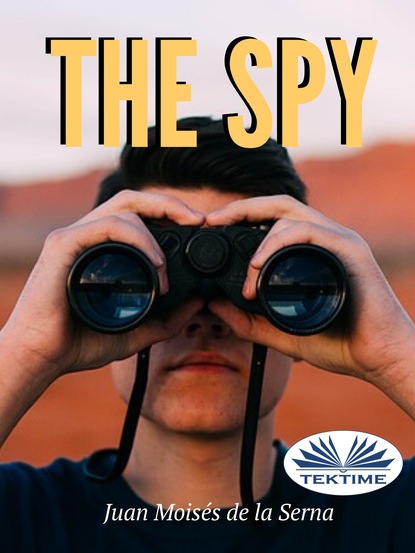
Полная версия:
Juan Moisés De La Serna The Spy
- + Увеличить шрифт
- - Уменьшить шрифт

Juan Moisés de la Serna
The Spy
"The spy"
Written by Juan Moisés de la Serna
Translated by Annibale Marsili
1st edition: may 2020
© Juan Moisés de la Serna, 2020
© Tektime Editions, 2020
All rights reserved
Distributed by Tektime
https://www.traduzionelibri.it
The total or partial reproduction of this book is not allowed, nor its incorporation into a computer system, nor its transmission in any form or by any means, electronic, mechanical, by photocopy, by recording or other methods, without prior writing permission from the editor. The violation of the aforementioned rights may constitute an offense against intellectual property (Art, 270 et seq. of the Penal Code).
Please contact CEDRO (Spanish Reproduction Rights Centre) if you need to photocopy or scan any fragment of this work. You can contact CEDRO through the web www.conlicencia.com or by phone at 91 702 19 70/93 272 04 47.
Preface
The silence had already taken hold of each of the rooms in the house, so much that sometimes it was difficult for me to go there, where so many things had happened in the family.
At the beginning, I turned on the television or the radio, to listen to a voice wherever I was in the house, and that comforted me, but then, it seemed so absurd, deceiving myself, doing as if I was accompanied, when there was nobody left.
Joys, sorrows and sadness, listened in every corner of that home, in which my wife had always worked with such care to maintain order and cleanliness.
Dedicated to my parents
Chapter 1. The Memory
The silence had already taken hold of each of the rooms in the house, so much that sometimes it was difficult for me to go there, where so many things had happened in the family.
At the beginning I turned on the television or the radio, to listen to a voice wherever I was in the house, and that make me feel better, but then, it seemed so absurd, deceiving myself, it was like I was with somebody, when there was nobody left.
Joys, sorrows and sadness, listened in every corner of that home, in which my wife had always worked with such care to maintain order and cleanliness.
Gradually I was closing the rooms, those which I didn't use at all, or those which brought me so many experienced memories just by seeing, most of them joyful, which strangely caused me great suffering, perhaps because I longed for them, or maybe because of the certainty that wouldn’t be repeated anymore, that everything that I lived there, would remain only in my memory, as long as it lasted.
Even though I told my wife repeatedly to move somewhere else, either because of work or retirement, she always said no, her place was where her memories remained, there she had seen her children grow up, and he knew the whole neighborhood, and that made him feel at ease.
For some strange reason she preferred to leave, as she said, "things as they were", without changing anything in the house, not a single picture or photograph, and when I asked why she just said, "that's fine".
I had been having trouble leaving on vacation, since on several occasions, when we were older and our sons had already moved out, when we were both alone, nevertheless, she always hoped someone appearing in the house, and finding reasons because she didn’t want to stay away from that place more than two or three days.
But how were they going to appear? If some of them lived in other continents, and with the one closest to us, we hardly kept in touch after we had that discussion.
It's something of which I still regret, not so much because it was completely unnecessary, but rather to the consequences it had in our relationship. Since then my wife looked at me in a different way, I know I was right, that our son was wrong, but she, as a mother, didn't understand why I didn't support our son when he needed.
For me her loss was the most difficult thing, just thinking to that moment, I can barely breathe, so many years of coexistence, although not always peaceful, there was always a lot of love and respect between us.
In recent years, we almost had separate lives, but we respected each other, we loved each other, but each one tried to develop their own activities without counting on the other, unlike when we met that we wanted to do everything together, and be sharing as much time as possible.
Perhaps it's the habit, but we almost did not see each other except for lunch and dinner, she had planned each evening, a different activity, sometimes going out with friends, sometimes visiting some relative, others …,I liked to be quietly at home, I had my notes and calculations, without realizing that she had left, but … when she died …
Everything changed, now I had more time for my things, no one who could tell me that I had been with it for too long, no one to remind me that I had to rest, no one… but for me everything I did, dedicated so much time and believed so important, for me, all that had lost its meaning.
The house had gradually turned into a mausoleum, I do not know why, but as the years went by, I filled the walls with pictures of the children, and grandchildren, which we were receiving from time to time, in occasion of a new birth or some celebration.
Now I can barely recognize the ones in those photographs, it's not just for the eyes, that's why I have the reading glasses and it would be impossible without them to see things with details, but those faces no longer tell me anything.
How many times I stopped discussing with my wife about different photos, about how happy we were, and the desire we had to see that again, instead now, they are there, like stops in time, as if they were from another life, to which I no longer belong.
Without her, I cannot imagine a past, in each of the places where we went, she was there, in every celebration we attended, she was there, and in so many photos, we were both, but now, except for her, I can hardly recognize the rest of the people in the photos, and … in addition, there's no one I can ask, there is not even with the one who to comment those photos.
Now they are part of the wall, as if it were a wallpaper, I don't stop to look at them, because for me they are strangers, one day they shared my life but now I do not feel them far away, I just do not feel them.
When I go down the corridor, sometimes I look at the photos that are hanging, they are from totally unknown places and people, curious to try to guess who they are or what they do, but no, I cannot remember!
An assistant occasionally comes home to do a little cleaning, at first she asked about my grandchildren, and I pointed them out on the photos, but now, I do not know where those photos are, nor do I know how many grandchildren I have.
I hardly want to talk, because I have nothing to say, my memories are painful, not because I have not lived much and have much experience, but because my most important memories are precisely those of my great loves, and those, unfortunately, are not with me anymore.
I can remember my first love like it was yesterday, she worked in a bar on the road, near the gas station, just outside the town.
I always refueled the minimum so that my vehicle walked, for having to go to put gasoline next day, and so having some excuse to enter that bar to have breakfast.
At first I had not noticed her, she was a new girl in the village, maybe someone passing by. Her kind smile and curly black hair made me go crazy. I was not sure if she had even noticed me, used to attentions of other men, but my persistence paid off. After a few months going there daily, one day she told me:
– Okay, tell me really, what do you want?
– Well, today I'd like to eat an house specialty! – I answered.
– No, really! You're the only of our customers who comes every day, it's cold or hot, and even when the gas station is closed, then what do you want?
I was left speechless, so I sucked it up and I happened to say:
You!
– What? – She asked astonished.
–Yes, all these days, weeks and months, I've loved you, and that's why I came to see you, to spend a day without seeing you is like taking off the morning sun!
She went to the kitchen running, I think she was confused by my words or something, and after a while she came back and said:
–I'm leaving, this is my last day of work!, I was here only to earn some money, before I went on my way, you have been very kind all this time, and thank you.
–But I…. I just declared.
–Yes, I know it and your words are very nice, but it was too late, if you had told me before, maybe we could have taken advantage of the time in another way, now … it's too late -That said, she turned around and followed with her work.
I could not taste anything, despite how succulent everything seemed to be, I just stayed in that place for five more minutes and left almost running, I could not believe it! I had gotten used to see her every day, her pretty smile and her black hair, and now … she left me.
I thought, I don’t know, to talk to the boss, to tell him to pay her more, I even thought to pay the boss for the difference in the salary increase, I thought to talk to her and ask her not to leave … I thought … but the next day, when I came back, believing that it had been a bad dream, she was no longer here, nor the next, nor the next … until I made up my mind that I would never see her again, that my great love had disappeared from my life, and I would never meet again a woman like her, she was unique.
Painful memories, I can still remember her smile and her hair, especially that hair, as I liked, it seems I am seeing, as if it were yesterday, removing it from her face, when that treacherous strand that was leaking fell out, and putting it behind the ear with her finger.
Although it was not a corresponded love, I have never been able to forget her, since she was my first love.
I do not have any pictures of her, so many scattered all over the house, but there is nothing of that part of my life.
Nor do I have any friends, neighbors, anyone known, they have left this world or have gone to the nursing homes.
The neighborhood is not what it used to be, now everyone is in a hurry, they don't go out in the morning to mow the lawn, nor to play with the children on weekends, sometimes, it's strange to be here, everything is so changed.
I know every house, every tree, but people are so unknown to me that I do not know … I do not feel comfortable when I go out, even though the people I meet always show me a smile after greeting me.
Someone occasionally still needs me, talking about my past, about my experiences, as if that is important, but I think I find it tough to face the time passing and that my best moments are already so far, that seems to be someone else's.
Years go by, and every time they leave more mark on my health, and unfortunately, they are taking away the memory, the most precious thing I had, all the rest, my personal belongings, I do not care if they get full of dust! Memories seem to be erased little by little, blurred like the mist in the morning, and so many experiences with them.
Someone has suggested that I should write a book, at my age, like it's so easy! I have even been asked to make a documentary about my life, but I have not seen it clearly.
So many things I could say, but I do not feel strong enough to remember everything, and not in front of a camera and with strangers listening to it.
Every time I remember a fact I get excited, since I live it as if it were happening at that moment, but then, when it's over, I have a deep sadness, when I realize that it's just a memory, something from the past, that remained relegated in time, almost forgotten.
I don't know why the memories of my youth and childhood are increasingly clear, I can barely remember what I ate yesterday, but I can do it about the adventures I had when I was a kid, or the most important things that happened to me during high school.
So many people with whom I spoke and I came across, so many who loved and loved me, family, friends and acquaintances, all that affection and shared emotion, and I do not know where any of them are anymore.
Surely they have made their lives, and they are enjoying their children and even their grandchildren, wherever they are, but sometimes I wouldn't feel so alone!
The nights are the worst moment, sometimes when I try to sleep I'm flooded with a lot of memories, experiences that happened in the house, the stories of an old man, can be said, but it's a whole life, day after day, how many things experienced! And I start thinking, and one thought leads to another, and to another, and sometimes the hours pass and I can't sleep, until fatigue and exhaustion make me fall weary.
At other times, the aches prevent me from spending the night, when it's not one thing it's another, if I stay in a position too long I can feel the knee or the back complaining, every night until I finally fall asleep.
Of course, the alarm calls me every day at six in the morning, just as it has done since I started working, when I was young.
A "my mania", as my dear wife said, that I never left, not even when I stopped having obligations once I got old, but I’ve always liked to take advantage of time, and not allowing the sun rise before me.
Perhaps it was force of habit, or perhaps I felt comfortable knowing what I had to do every morning, anyway, as much as she tried to persuade me, I always woke up at the same time, whether the sun rose or not.
Every day, as soon as I got up I looked for an open space and did my exercises, a few stretches, to have some flexibility, enough to wake up before washing my face with cold water.
"The secret of my smooth skin is the cold water in the morning!" I heard about that from a famous actor, who bragged about his skin despite his age.
At my age, I don't do it for aesthetic, or for the skin, just to clear it, but whereas that was necessary for a long time, it made me ready to go out to work and start the day, but now … many times I stay in front of the sink mirror asking me, "What now?"
I go back to wash my face, hoping that I can think of something to do in the day, and nothing … I look in the mirror, and it returns a face I barely recognize, some wrinkles that were never there, now covering my whole face and not only, I'm also seeing the hands…
I don't know how others are as they get older, but in my case, it has not been a pleasant thing to see how little by little all my dreams and illusions have been diluted over time.
I have achieved a lot, but why? Who will remember me, my work and effort? Who cares now about the thousands of hours dedicated?
Eventually, it's true that someone can recall when one day he met me, but apart from friends and family, no one cared about what I did and achieved.
I can't complain, I spent a relatively good life, I always devoted myself to what I loved the most, but nevertheless, right now … there are only memories, and on many occasions not even that.
Sometimes I went to the office, where I have so many folders of work accumulated, years ago, I sat and opened some of them and reviewed, looking at the work done and reminding it.
So many notes written with evident emotion, thinking that it was going to "make a difference", as today's young people say, and time has left everything in oblivion.
Years have gone by and what I remembered before with pride, became almost a strange sensation of curiosity, I saw those heaps, and I didn't know what was in there, I opened them to know what they were, with an approaching anxiety, it's sure that all that was mine, but I didn't remember I wrote this, or when it happened.
I was sure it was my handwriting, at least I did not doubt, and that it was in each of the hundreds of notebooks and reports scattered there, but little else I was able to recognize the time spent in that work.
This was when I realized what was happening to me, I was losing my memory, which was always so good, now I was unable even to recognize what I wrote.
My papers were already the papers of a stranger with my handwriting, unable to see any kind of order among such a folder.
It made me frequently so angry that I threw the folders on the floor, and … I do not know … I tried to make it not so … but everything was useless, and the feeling of despair invaded me, making me believe that life doesn't do any good..
After a while, when I made me feel calm, I picked up paper for paper, and without knowing why, I put them where I thought it was their place, without being able to even remember what they contained, I just managed to classify them according to the date that appeared in each of those manuscripts in their upper right side, as strenuous as it was this task, I didn't leave it until putting together that puzzle, although I couldn't put everything in a chronological order, at least together according to every year.
I have not returned there in a very long time, it makes me angry! So many hours of work between those four walls, those papers that I no longer know what they are, not even if they are still good.
Sometimes I sit in front of the TV, even when is off, and I try to remember some past moments, times when serious events were hidden from the public to avoid alarming them and I imagine what their life would be like, without noticing they were in danger.
They carried out a very busy life, they barely notice the work behind it in order to bring there the sense of well-being.
I still remember the first time I have heard a discussion about the subject, my gifts for numbers had made me stand out among my teammates, it was during military service, something that would have gone unnoticed by anyone, but not my captain, when he realized it, he wanted to offer me a promotion.g
A decision that I will always be grateful for, because it gave the opportunity to do a great service for my country and to save so many of what could have been a painful death.
–You have a gift! – the captain told me that day.
–I don't believe it's a gift, it's a talent – I replied.
–A talent? He asked startled
–Yes, a talent given by the Creator.
The captain completely puzzled, after a long pause said:
–Whatever! I'm sure you will do better service in Pennsylvania, over there they will prepare you to complete something important.
–But, what about my parents? What am I going to tell them? – I replied, between surprised and bewildered by his words.
–Do not worry! The army will look after your family during your absence, that is what you wanted, right?
–Yes, indeed, we just arrived and my parents don't know the language, and although some friends of ours help them out, they still haven't found a job.
–Relax! They will get the paycheck right on time every month, but you have to fulfill your duty.
–Of course, I'll be the best! I won't let you down!, but what am I going to Pennsylvania for?
–You will have time to figure it out, all I can say now is : make your parents feel proud of you!
Those were his last words or orders , I'm not sure!, because next day, two soldiers arrived at my barracks where I slept with my platoon and they took me out of the base where I was completing my training, they took me to an uncertain destination.
Wow, how strange! I can almost chew the sand that the jeep was raising from the road as we were approaching that military base.
It was a particularly hot day, despite of, the emotion of the moment prevented me from thinking about something other than finding out how I could use my talents.
I remembered it almost as if I was living it, and despite that, I'm unable to remember the name of the base.
I am sure that after three years of training there, I would know without hesitation but the passage of time erases what you want and without warning.
Although even the most familiar names have dissipated from my memory, I have long since came up with a system by which I wrote down all the important names, dates and events of my life, and from time to time, I placed a white paper on the side and tried to write down everything I remembered.
It was a child's play! At first, how could I not remember the name of my grandchildren? Or the date of my wedding? But over time, the blank sheet I was trying to fill in, remained more blank to my despair, until one day, I came to forget where the list was stored, where I listed the dates, names and events that I never thought I could forget.
I still remember when we bought that toaster on the kitchen, and how my wife and I fought over the color. She wanted it lemon yellow, and I preferred it silver.
In the end, as in all things, I gave in to her decision, in fact our fights, if you could call them that, were due to insignificant things on most occasions, then, Why not giving in ?, deep down, Did the color of the toaster actually matter?.
She was comfortable having everything in her own way, although those bright colors did not convince me, but she always said something like: "this cheers the room up".
However, now I am not able to remember when it stopped working, if it broke down, or why I no longer use it, for me it is another dish, like many of those that I find in the house, of which sometimes I doubt how to use.
Sometimes I open the drawers to see what's inside, and I find everything, pieces of junk in some, tools in others, empty boxes in the one beyond, I didn't know that we could accumulate so many things that now are unusable.
In one of the drawers I found a toolbox, I have never changed a light bulb! Why would I want it now?, Despite thinking about it, and after a few moments of looking at it, trying to remember if it was ever used, I just close the drawer.
My wife, how much I miss her!, if I only knew where she is, surely in heaven! But heaven is so far away!
I have no doubt that if someone has deserved a rest it has been her, always so willing to help others in whatever they need, and she did it all with a big smile and without any protest.
She didn't even complain about the many hours of loneliness that she spent while I remained locked in my office working, or about the trips I had to leave for weeks.
Every time I was back, she had a beautiful smile waiting for me and a warm voice to ask me how the trip went, even though I knew I couldn’t tell her anything related to my work.
Sometimes I get up and after washing up and completing my exercise routine, I sit down by the dining table, and I wait, and wait, I don't know for how long , until I realize that my wife is not there anymore and that she will not longer bring me breakfast, then, great sorrow invades me and I barely feel like getting up and fix my self breakfast.
In fact, is not my thing to be in the kitchen, since I never excel at cooking or frying anything, only when I didn't have any other choice I helped whenever was asked for, specially at parties, when we hosted big crowds and my wife couldn't manage to prepare everything.
I liked better to set up they able and scrubbing at the end of the meal, and go grocery shopping when we didn't get it delivered at our door, but that was about it.
On the other hand, since she's gone, if you could call it that, and despite that at the beginning I was resisting because I considered it “her territory”, now it feels like I'm spending my life in the kitchen.
I have never realized how much work the kitchen demands, and the hours it takes, and also the sorrow of knowing that those were her things and that now she will never use them again.
Many times… I stayed quiet, waiting to hear something, maybe a noise coming from the kitchen as it did while she was fixing dinner, maybe her singing while she was looking after her plants,… well, I don't know what is it that I'm doing, but I miss her greatly, that I do know.







